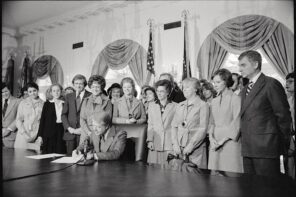Mississippi Initiative 26, the “personhood” amendment on the November 8th ballot, is not only dangerous for women’s health and lives—it is dangerous for our democracy. While not recognized as such, it is an openly theocratic endeavor. We should be talking about theocracy because this amendment is not just being fielded in Mississippi—it has been introduced in at least six other states, with more to come.
We know the harm that Initiative 26 would do by effectively ending access to reproductive health care in Mississippi—including banning all abortions, with no exceptions for rape or incest or the life of the woman; some forms of contraception; and in vitro fertilization. Not to mention the frightening possibility that doctors would not be able to provide life-saving medical treatment to a pregnant woman, for example, in the case of an ectopic pregnancy. We should also be aware that this amendment would enact in law a specific religious view about “personhood” that is in conflict with views held by most religious denominations and many people of faith—a clear intrusion by government into decisions of conscience.
I call this campaign “theocratic” as a Baptist minister who holds all human life to be sacred. But issues around human life are not as simple as the “personhood” proponents believe. In my view, we have a solemn responsibility to find balance in the complex area of moral decision-making around reproductive choices. Regarding abortion, I respect the value of potential human life while remaining firmly committed to women’s right to act according to their conscience in a decision about a pregnancy. This is a view held by many religious denominations and millions of people of faith.
It is no secret that personal religious views motivate the “personhood” campaign. The group organizing the Mississippi initiative, Personhood USA, defines itself on its website as a Christian ministry that “desires to glorify Jesus Christ in a way that creates a culture of life.” The executive director of Yes on 26, Brad Prewitt, has described the conceptual origin of personhood as being “the Bible, Genesis.” He also says that “Personhood is bigger than just shutting abortion clinics; it’s an opportunity for people to say that we’re made in the image of God.”
The Christian Medical and Dental Associations, which reject the accepted medical definition of pregnancy as the implantation of a fertilized egg, say the amendment is based on “undeniable scientific and medical evidence as well as on clear recognition that God is the creator of life.” Mississippi’s largest Christian denomination, the Mississippi Baptist Convention, is backing the personhood proposal through its lobbying arm, the Christian Action Commission. “The Lord expects us to value life, even as he does,” the commission’s executive director, Jimmy Porter, says in a video.
I respect their right to argue their case and pursue peaceful, legal means to reach their goal; even though it will be shown ultimately to be unconstitutional. But I ask that they acknowledge and respect that there is a wide variety of teachings and beliefs about personhood among religious groups, and that there is no consensus on the question of “when life begins”—often even within a particular faith tradition. Most religions hold that the decision about contraception and abortion must be a woman’s.
Yet, in the fashion of those who are determined to embed their religious views in law, there is no acknowledgement that there are other, equally valid views. Because there are a variety of views on such a basic question as “the beginning of life,” the constitution guarantees that decisions about contraception and abortion will be protected by law. And that is where the matter should rest.




